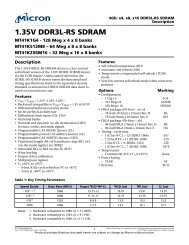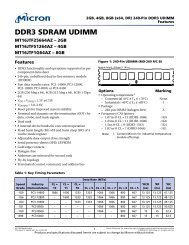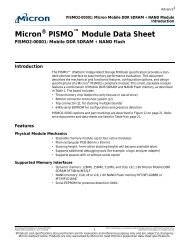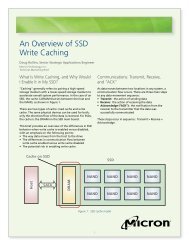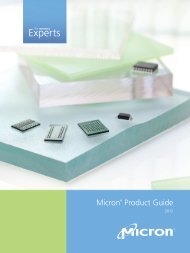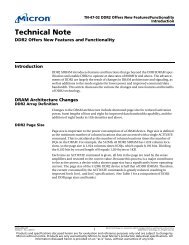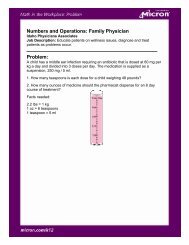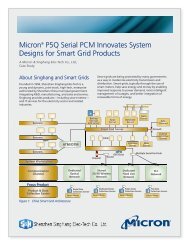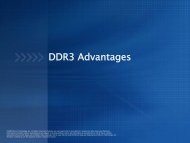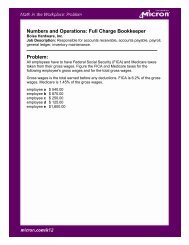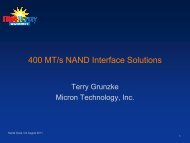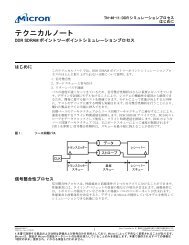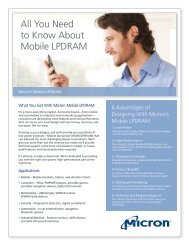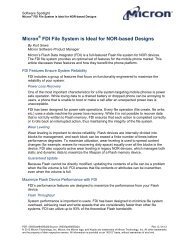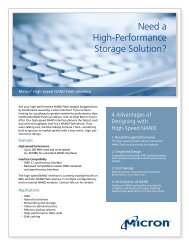Code of Business Conduct and Ethics - Micron
Code of Business Conduct and Ethics - Micron
Code of Business Conduct and Ethics - Micron
You also want an ePaper? Increase the reach of your titles
YUMPU automatically turns print PDFs into web optimized ePapers that Google loves.
Company Access To Resources And Information<br />
Any communications, records, information or work product created during work, or<br />
contained in or created with Company resources or property, are not private <strong>and</strong> may<br />
be accessed, monitored or reviewed by authorized Company personnel at anytime<br />
<strong>and</strong> for any reason. This includes, among other things, e-mail, notes, computer files,<br />
Intranet or Internet activity, voicemail, cell phones, paging messages <strong>and</strong> telephone<br />
conversations.<br />
Intellectual Property<br />
In general terms, intellectual property consists <strong>of</strong> the rights associated with patents<br />
(which cover inventions), copyrights (which cover writings, drawings, music, web<br />
content, s<strong>of</strong>tware <strong>and</strong> the like), trademarks (which cover br<strong>and</strong> names), <strong>and</strong> trade<br />
secrets (which cover confidential information). <strong>Micron</strong>’s intellectual property is one<br />
<strong>of</strong> its most valuable assets. Just as we do not want others to use <strong>Micron</strong>’s intellectual<br />
property without our permission, we should respect the intellectual property rights<br />
<strong>of</strong> others. Consult with someone in the Technology Licensing Group <strong>of</strong> the Legal<br />
Department if there is any question as to your right to use or access intellectual<br />
property not owned by <strong>Micron</strong>.<br />
For questions regarding patents, contact the Patent Prosecution Group <strong>of</strong> the Legal<br />
Department. For more information on trade secrets, see the section on “Confidential/<br />
Proprietary Information And Trade Secrets.”<br />
Some basic rules to follow regarding copyrights <strong>and</strong> trademarks:<br />
• Remember that U.S. copyright laws protect works even if they are not registered<br />
with the U.S. Copyright Office <strong>and</strong> even if they do not carry the copyright<br />
symbol ©. Therefore, you must assume that all writings, drawings, web content,<br />
music, s<strong>of</strong>tware <strong>and</strong> the like are protected by copyright.<br />
• Do not load or install any unlicensed s<strong>of</strong>tware on any <strong>Micron</strong> computer.<br />
• Do not copy information or other materials (e.g., text, drawings, pictures, audio<br />
or video) from the Internet or any other source without specific permission from the<br />
copyright owner. Consult the Technology Licensing Group <strong>of</strong> the Legal Department<br />
if in doubt, including whether a “fair use” exception under applicable law may<br />
allow the use <strong>of</strong> brief excerpts.<br />
• Check with the Technology Licensing Group <strong>of</strong> the Legal Department before<br />
adopting a new trademark or br<strong>and</strong> name for a <strong>Micron</strong> product <strong>and</strong> before using<br />
another company’s trademark in <strong>Micron</strong>’s advertising or marketing materials.<br />
Q<br />
Fred, one <strong>of</strong> the engineers<br />
in my department, uses<br />
expensive s<strong>of</strong>tware for circuit<br />
analysis. The s<strong>of</strong>tware is<br />
loaded on his workstation.<br />
Other engineers in our<br />
department have indicated an<br />
interest in trying the s<strong>of</strong>tware<br />
on their workstations. Fred has<br />
<strong>of</strong>fered to allow the engineers<br />
to copy the s<strong>of</strong>tware onto<br />
their workstations <strong>and</strong> to<br />
make a copy <strong>of</strong> the user<br />
manual. Is it acceptable to<br />
make copies <strong>of</strong> this s<strong>of</strong>tware<br />
<strong>and</strong> the user manual for use<br />
on a trial basis?<br />
A<br />
No. Making copies <strong>of</strong><br />
s<strong>of</strong>tware that is licensed for<br />
use on only one computer,<br />
even if copied for use on<br />
a trial basis, would violate<br />
copyright law <strong>and</strong> the<br />
license agreement under<br />
which the s<strong>of</strong>tware was<br />
purchased. This applies to<br />
the user manual as well.<br />
The rights to copy s<strong>of</strong>tware<br />
are limited by the license<br />
agreement under which<br />
<strong>Micron</strong> purchases the<br />
s<strong>of</strong>tware <strong>and</strong> by Federal<br />
copyright law. If others<br />
want to use the s<strong>of</strong>tware<br />
on their workstations on<br />
a trial basis, <strong>Micron</strong> must<br />
first enter into a s<strong>of</strong>tware<br />
evaluation agreement<br />
with the s<strong>of</strong>tware supplier.<br />
Copying unlicensed s<strong>of</strong>tware<br />
onto your computer or<br />
workstation is a violation<br />
<strong>of</strong> this <strong>Code</strong> <strong>and</strong> <strong>of</strong> Federal<br />
copyright law.<br />
27



